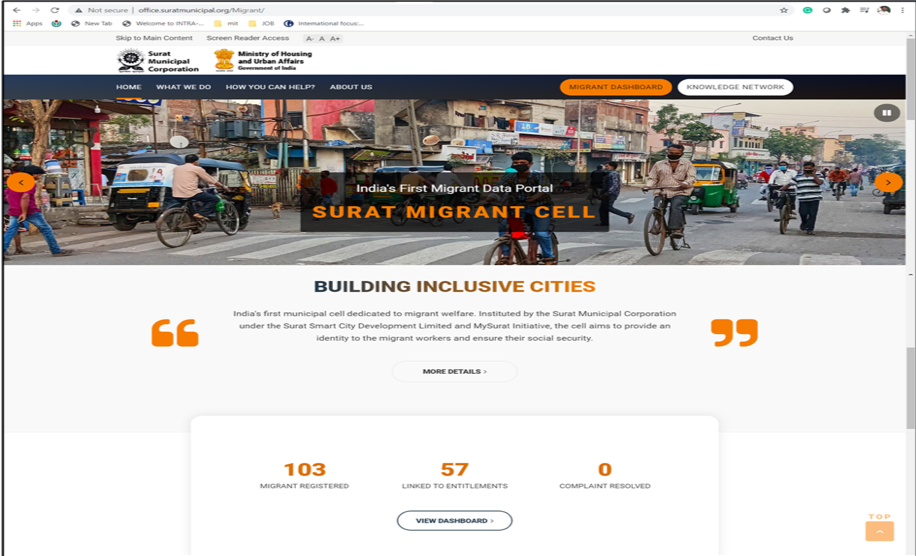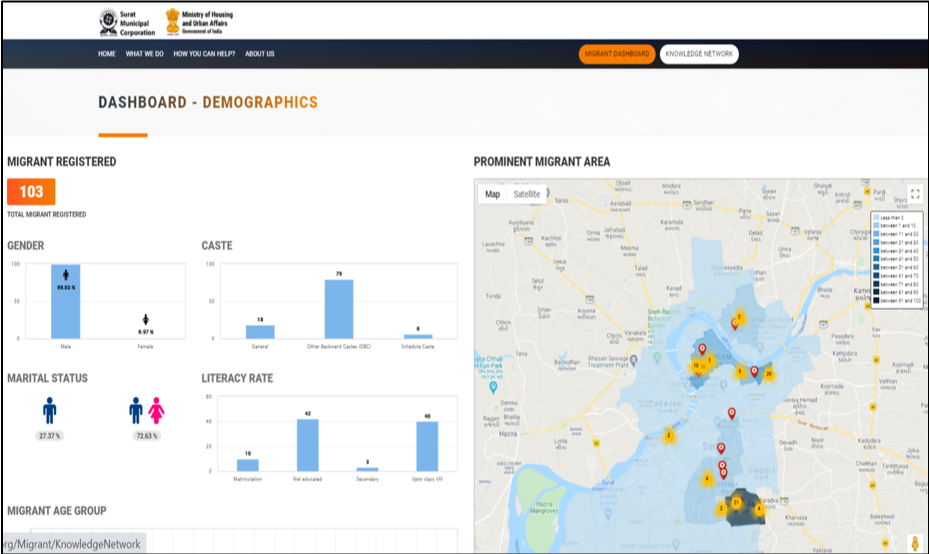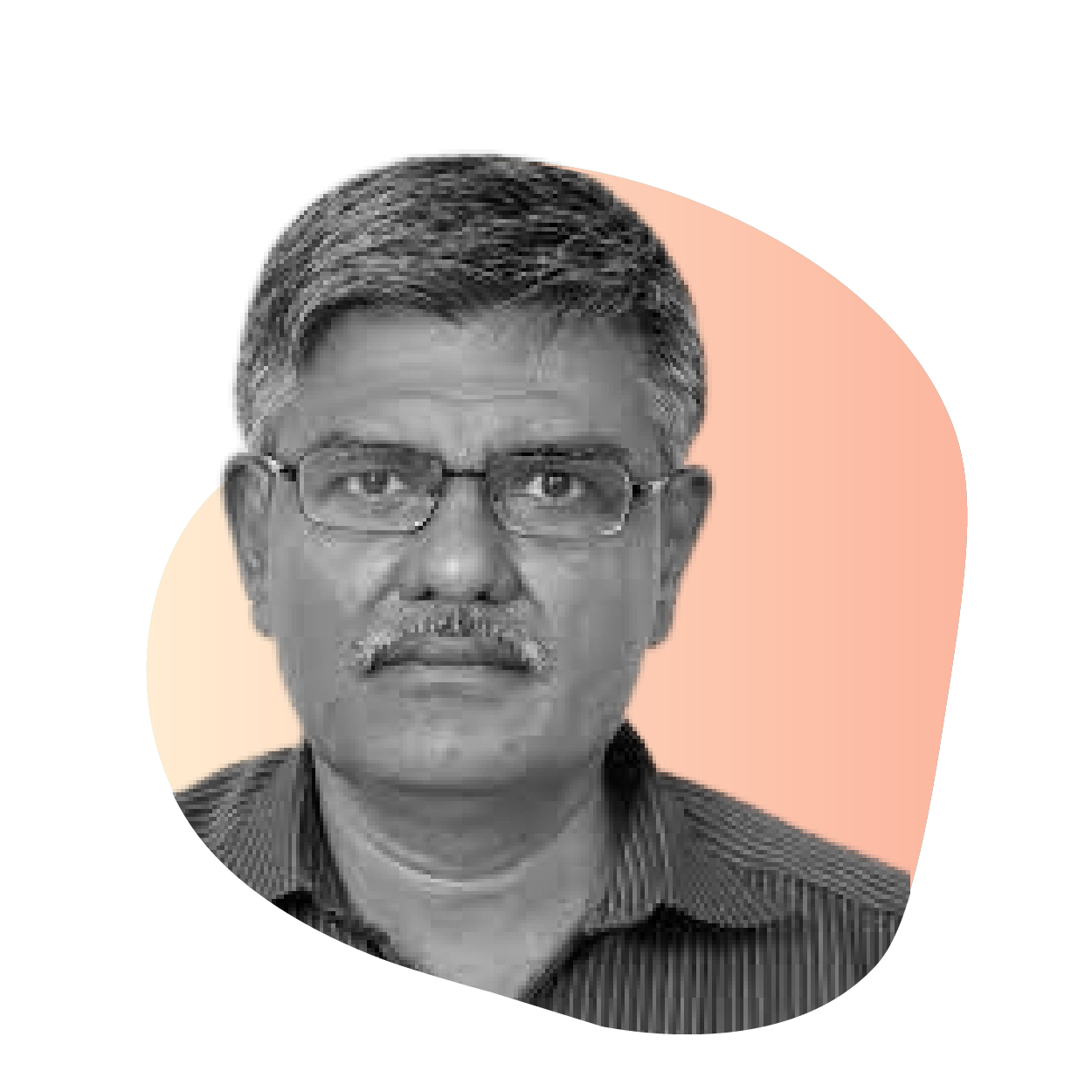To enable registration and enumeration of migrant workers in the city of Surat for the provisioning of services and entitlements through the urban local body
UMEED
Context
Migrants have always been perceived as a burden and threat to the host cities and communities, overlooking the developmental benefits associated with their movement. As a consequence of these negative images and the lack of inclusive governance, migrants face multiple challenges such as accessibility to affordable housing, amenities, entitlements, exploitative working conditions, labour market discriminations, to name a few. One of the biggest challenges is to reverse this hostility trend towards migrants and build a narrative based on the positive reality of migration.
These issues possibly arise due to the lack of identity in the destination cities. The right to freedom of movement is constitutionally protected, but it does not guarantee access to entitlements, voting rights in local, state, and national elections, or even access to government schemes. Lack of political will, acknowledgment, and policy gaps in the existing governance system has led to their invisibility in the cities. The existing framework for their protection is being poorly implemented and underestimates the scale of the issue.
Considering the above challenges and opportunities, team UMEED (Urban Migrant Enumeration for Equity through Data) has worked with Surat Smart City Development Limited and Surat Municipal Corporation to design an end-to-end process for registration and enumeration of migrant data in the cities while also provisioning schemes and services for the migrants thus making the city more inclusive.
Problem Statement
Populations bereft of their daily wage and secure tenements were forced to undertake arduous journeys back to their villages in the wake of the lockdown and the fear of the ‘rich man’s disease’. India saw one of the largest movements, stemming from its exclusionary policies, which emphasized the urgent need to relook at the gaps in governance of migrant workers in the country. In response, a series of economic policies were announced, and various schemes were drafted by different states to assist the return of migrants, all working, albeit in silos.
Between 2011 and 2016, 9 million people migrated annually between states in India, contributing roughly 10% to the GDP. Despite their contribution, migrant workers remain outside the purview of governance in the city. Due to lack of political will and unavailability of data on migration, migrants do not have access to even basic services including housing tenure, food and fuel, healthcare, sanitation facilities, childcare, and creches amongst others.
Keeping this as the base, this project will address the problem of lack of data on migrants by incentivizing self-registration through a mobile application. This exercise of self-registration will assist the migrants to orient themselves to the new environment in the city and gain access to services while ensuring better service provisioning by the urban local bodies due to the availability of data.
Objective
This project aims to facilitate the Smart Cities Mission vision of developing inclusive cities. Through a data-led approach, it hopes to enable the migrant workers and ULBs to form a mutually beneficial bond where migrants can access their right to the city and the ULBs can make informed decisions to better govern the marginalized migrant worker population. To achieve its broader vision of exercising the migrants right to the city, this project aims to achieve two types of objectives - short term (to be achieved within the tenure of the fellowship) and long term.
Short-Term
To design an end-to-end mechanism for migrant worker enumeration and build a city-specific application with the help of the framework to connect service agencies, the ULB, and migrant workers.
Long-term
Bridge the gap between local governance and the migrant workers by highlighting their importance to the city economy through data and build a centralized database for more effective outreach of migrant-centric or unorganized sector centric schemes or initiatives.
Project Strategy
Pilot City Identification
The process to identify the city followed an unbiased methodology. The mentors suggested exploring a mid-sized city considering that 10 million+ cities would be too vast to handle for a pilot and a smaller city with less than a million population would not have enough migrant presence. Other than this, thirteen indicators/variables were considered and allotted weights to form a matrix to finally score each city on a 10-point scale. The weights were assigned subjectively based on their relevance and importance in carrying out the project successfully.
Bhopal, Jaipur, Bhubaneshwar, Surat, and Faridabad were among the top five cities that were selected based on the city selection matrix. As part of the final ideation review by the Ministry of Housing and Urban Affairs (MoHUA), it was suggested that Surat be chosen as a pilot city for the project.
The city of Surat was a good fit for the pilot as it witnesses nearly the highest migration rate vis-à-vis all cities in India due to the presence of labour-intensive employment opportunities in the entire hand-woven textile value chain, diamond, and construction sectors. As per Census 2001, data of migrant population constitutes 55.85% of the population in Surat city’s agglomeration, which is remarkably high compared to other major cities. As per a UNESCO report published in 2013, migrants comprise almost 58% of the population in Surat.
Project Development and Implementation

Expected Outcomes

The expected outcomes from the project are listed below:
- Creating a space for migrant worker data collection
- Improving access to schemes and services of the government for the migrants
- Giving due recognition to the migrant who has been invisible in the city
- Providing systemic support to the migrants by becoming a one-stop shop for all information required in the city
Actual Result
There was a revision in the product deliverable. As part of the system to register migrants, the application developed by Bandhu Urban Tech Pvt Ltd would be used, the surveys would be conducted by Aajeevika Bureau (non-profit agency) and the Surat Migrant Cell, a helpdesk for migrant workers shall be run by the Urban Management Centre ‘UMC’ (non-profit agency) to use this data to provide entitlements. In collaboration with Surat Smart City Development Limited and Urban Management Centre, the team worked on:
1. Creation of SOP document for the Surat Migrant Cell: The proposed policy document determines the institutional framework, proposed functions based on workshops with various stakeholders, and funding methods to run the body.
2. Design and execute the website for the Cell and create an analytical dashboard

The website contains information on the institutional set-up of the Cell and its functions along with two major components – the Migrant Dashboard and the Knowledge Network. For the Migrant Dashboard we undertook two tasks - One was to analyze the data being collected in the primary survey by UMC and understand the procedure instated for data capturing and two was the development of the web portal.

In the first task, the team suggested additional fields to create a more holistic dataset. This included inculcating a feedback system for the linkages to entitlements, mapping the occupational patterns, capturing locational data and the home state of the migrant workers.
The Knowledge Network shall facilitate stakeholders working for migrants to exchange best practices, events, and migration statistics.
Conclusion
The project can be scaled up as manufacturing and construction industries mushroom in the peripheries of the city; hence the initiative can be scaled up outside the ULB boundary and into the district jurisdiction. The project can be replicated in other cities which observe high-levels of internal migration. A city-migrant cell can be initiated by ULBs with the help of empanelled civil society actors looking after the registration of migrants for entitlement provision and other support.
In the future, an open-source application for both feature phones and smartphones can be developed for a migrant worker to self-register. An exchange portal can be developed for stakeholders responsible for registration and entitlement provisioning; this can help create a robust and updated data system of registered migrant workers.








